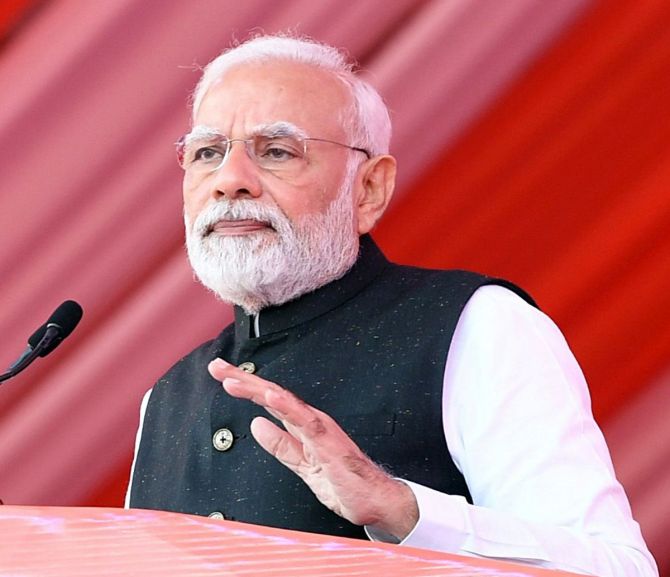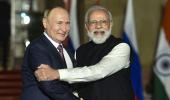Prime Minister Narendra Modi is expected to lay out India's perspective on addressing key global challenges in areas of health, post-pandemic economic recovery and energy and food security at the G-20 summit in Bali that is taking place against the backdrop of Russia's increasing confrontation with the West over its invasion of Ukraine.

The summit of the world's biggest economies on November 15 and 16 assumes significance for New Delhi as it will see handing over of the G-20 presidency to India by Indonesia at the closing ceremony of the annual gathering.
Modi is travelling to the Indonesian city on Monday on a three-day visit to participate in the summit which is also set to be attended by Chinese President Xi Jinping, United States President Joe Biden, British Prime Minister Rishi Sunak and French President Emmanuel Macron, among others.
At a media briefing, Foreign Secretary Vinay Kwatra said Modi will have separate bilateral meetings with a number of leaders on the sidelines of the summit but did not give a direct reply to questions on whether there will be a meeting with Xi.
"These bilateral engagements with the other leaders are still in the process of being scheduled. This is something which remains under evolution," Kwatra said.
The two leaders attended the annual summit of the Shanghai Cooperation Organisation (SCO) in Uzbekistan's Samarkand in September but there was no bilateral meeting between them.
Kwatra said PM Modi will participate in three key sessions -- food and energy security, digital transformation and health -- at the G20 summit and that he and other leaders will deliberate extensively on key issues of contemporary relevance, including the state of the global economy, issues relating to energy, environment, agriculture, health and digital transformation.
"The Bali summit comprises three working sessions at the leader's level where the PM will be participating. These include the sessions on food and energy security, a session on digital transformation, and a session on health," Kwatra said.
He said the G20 deliberations have acquired a greater salience as it is taking place against the backdrop of global challenges such as uneven post-pandemic economic recovery, debt vulnerabilities especially in the countries of the global South, the ongoing conflict in Europe, and its knock-on effects, such as food security challenges, energy crisis and inflation, on all countries of the world.
"The G20 leaders will discuss these challenges and underscore the importance of closer multilateral cooperation to help overcome these challenges," he said.
The foreign secretary said the summit is particularly special for India as it will hold the presidency of the grouping from December 1 for a one-year period, and the presidency handover will take place during the summit in Bali.
"India as the next chair would endeavour to provide a greater voice to issues of interest to the global South and steer the G20 agenda in a representative and balanced manner," Kwatra said.
Asked about Modi's bilateral meetings, he said these engagements with the other leaders are still in the process of being scheduled.
"This is something which remains under evolution."
Official sources said Modi will have around 20 engagements during his nearly 45 hours of stay in Bali and he will hold bilateral meetings with around 10 world leaders.
On India's incoming presidency, the foreign secretary said its position has been of 'steadfast and strong support' to Indonesia, which as the Presidency has shown strong leadership in ensuring that the G20 platform discusses issues of substantive interest to the world.
"The prime minister would receive the G20 Presidency from the President of Indonesia at the closing session of the Bali Summit, and as you all know, India will host the next G20 Summit in September 2023," he said.
Kwatra said Modi will also utilise the opportunity of his presence at the Bali summit to invite the G20 leaders to India's G20 summit.
The G20 summit programme also includes a leaders' visit to what is called Bahasa Indonesia, Taman Hutan Raya, which is a mangrove forest in Bali.
Kwatra said, Modi, in his bilateral interactions with the G20 leaders, will brief them on India's evolving G20 priorities as also to review key elements of bilateral engagement.
"India's G20 Presidency hopes to provide new strength, direction and perspective to G20 discussions on diverse subjects which include green development, lifestyle for environment, digital transformation, inclusive and resilient growth, women-led development and more importantly, greater voice for the global South in issues of international economic cooperation as also on the need for reformed 21st century institutions," he said.
During India's G20 Presidency, Indonesia and Brazil would be the Troika.
"This would be the first time in G20 that the Troika would consist of three developing countries and emerging economies in a row," he said.
In Bali, Modi will also address and interact with the Indian community and friends of India at a community reception on November 15.
Indian community and diaspora have a strong presence across Indonesia. Modi will depart Bali on November 16 at the conclusion of the Bali Summit.
Kwatra said the delivery of governance using digital platforms and using digital instruments is set to figure in the deliberations at the G20 summit and highlight India's competencies in the areas.
When asked about what would be Modi's message at the summit, Kwatra did not give a direct reply but listed continuing uncertainty and challenges relating to climate, health and energy security, among others.
"The challenges relating to the food security, the pandemic has clearly shown us the problem of the global health security that all of us encounter," he said, adding discussions would take place around them.
"And at this stage, I can't tell you for sure what the Prime Minister's interventions would be, but I'm assuming that it would be an intersection set of many of these elements and specific subsections of these elements," he said.
Asked whether the G20 communique will mention the Ukraine conflict, Kwatra said it is adopted by consensus.
"It is not a document that is voted upon. So whatever communique is there, it would be a consensus document," he said, adding, "I think it remains to be seen because it is still under discussions and negotiations in Bali."










